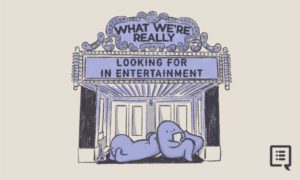Seeing Glimmers of God’s Truth in Surprising Sources
As someone who grew up in the era when the church engaged in boycotts and condemned rock music, I was rather caught up with the “culture wars” of my youth. I cringe to think of how strongly I had advocated for the “purity” culture (which was way more than just sexual purity). I listened only to Christian CDs. Even now, when someone refers to a certain secular song, I shrug. “I kinda grew up under a rock,” I grin lopsidedly.
Unlike me, my husband grew up largely outside the church, which meant he missed these “culture wars”. So, instead of drawing lines of black and white in cultural issues, he sees things less rigidly: he understands better the intricate combinations of good and evil, truth and untruth.
In movies, my husband looks beyond the genres to see the good triumph in its battle against evil; in secular music, he can hear the soul-level questions conveyed with perhaps more honesty than Christians are comfortable with.
A few weeks ago, my daughter sent me Taylor Swift’s This is Me Trying—because it illustrated my daughter’s own struggles with mental health. She innately felt like that song “got” her. You won’t likely hear the lyrics of “Christian” songs saying my words shoot to kill when I’m mad or I didn’t pour the whiskey, but they also didn’t capture the depths of my daughter’s conflict and longing.
My husband’s also taught me how sometimes when I lump cultural matters into black and white—trying to eliminate all ambiguity–I may miss some of God’s truth that human culture illuminates poignantly. Especially when it’s the brokenness of sin and our great need for a rescuer.
Am I suggesting you pull a Game of Thrones marathon? Not really. I’m not offering some convoluted excuse to overturn what the Bible says about thinking things that are true, noble, right, and lovely (Philippians 4:8), or to love what the world offers us (1 John 2:15).
This is about learning discernment and resisting the urge to resort to simplistic categories for cultural issues and people (especially because culture wars tended to bring out a Pharisee-like superiority in my heart).
Learning to discern God’s truth
As Augustine famously wrote, “All truth is God’s truth.” That means whatever our culture uncovers of God’s truth still belongs to God, and we can celebrate it as such.
We can search out the beauty and truth our culture unveils, and turn them to God’s ends. I see this when Paul openly quotes secular poetry and myths in Athens, hijacking it for the sake of uncovering the truth the Athenians crave (Acts 17:16-34).
Seeing God’s truth everywhere, and from unending sources, changes everything. We hear it in verses like, “To the pure, all things are pure” (Titus 1:15) and “Your eye is the lamp of your body. When your eye is healthy, your whole body is full of light” (Matthew 6:22). God’s truth helps me discern and recognise truth in all things, able to learn from any source at any time because it’s all filtered through His Word and His Spirit.
Instead of shielding our kids, my husband and I choose to use cultural interactions and media as stepping stones for some of our most crucial discussions with them.
For example, when my kids were smaller, I allowed them to watch Bill Nye The Science Guy. Now, Bill Nye believes quite differently from what I do. He’s extremely outspoken in his view that God did not make the world. And yet he is a fantastic science teacher. And I believed my kids, knowing Who is the true Source of science, could still learn a lot about the world He made through Bill Nye.
So I listened in on what Bill Nye’s videos are saying, and used it as a springboard for conversations that may prepare them for apologetics for the rest of their lives—in their own heads, and with others. God willing, they will master that truth and use it for His honour.
Here’s a more recent one: A famous podcaster in my country, who one of my teenagers likes, openly uses marijuana. Rather than banning the podcast from a 17-year-old, we thought it was a good opportunity to ask my son questions about what he thinks—to teach him discernment. What does this podcaster do well? What does he get wrong? What do you think about him using his platform to advocate for weed?
Rather than seeing cultural themes as affronts to my faith, I’ve begun to see more of these as openings for dialogue toward God. Doing so makes my husband and me gratefully aware of God working everywhere. It turns a lot of the more “secular” into sacred.
It also reminds me that I’m no better than others, and that I’m just as profoundly in need of Jesus. More to the point—is corruption always outside of us? Or does it also arise from sinful desires, perhaps hidden ones, already inside? Remember Jesus’s words: “For out of the heart come evil thoughts, murder, adultery, sexual immorality, theft, false witness, slander. These are what defile a person” (Matthew 15:19-20).
Using culture to engage people who need Jesus
So we continue to use culture toward redemption, because holing ourselves up in a secular-culture-free bunker makes us miss not only ways to grow and learn and see God’s redemptive elements, but also opportunities to engage real people who need Jesus.
When I lived in Uganda, I had to learn a new language, which meant assuming the posture of a learner and choosing humility and understanding. It communicates, “I care about you enough to understand how your heart speaks.”
I’ve thought about this upon returning to the United States, and as I get to know the LGBT+ community and invite them to dinner at my house. To be a missionary invited into heart-level conversations, I need to understand their history, culture, and language—and what questions their souls are asking. Which may occasionally mean watching a movie incorporating these perspectives.
Tim Keller, in his book Preaching: Communicating Faith in an Age of Scepticism speaks of how we can respond with “Yes, but no, but yes” when engaging in culture matters. What he means is that we can learn to deeply understand (resonate) with the culture, to affirm its questions even when we don’t agree with the way it goes about answering them.
To paraphrase, it’s learning to respond this way: “Yes, this ‘hole’ that you feel, this question you’re asking, is legitimate. But no, you’re not looking in the right place. God is your ultimate yes in this; He’s got what you’re famished for.”
Take the movie Wonder Woman. Is she a flawless character? Nope. But according to my friend Marilette, “Wonder Woman is the first superhero to be fully equipped in combat skill, yet purely motivated by love and not vengeance (or some other complicated, bitter backstory).” She argues that Wonder Woman might be the most accurate on-screen depiction of biblical womanhood.
We may not all agree with that take, or we don’t want to make too much of fictional characters or cultural icons. But exploring ideas and themes like these in media can lead to thoughtful discussions and create openings for spiritual conversations with friends who have yet to share our faith.
So, whether you’re thinking through the lyrics and narrative of Taylor Swift or just overhearing Bill Nye, learn to trace the breadcrumbs of truth that God has scattered throughout culture to help people “feel their way toward Him and find Him” (Acts 17:27).
Yes, keep an eye on your soul, and the stealthy ways sin overtakes us in our entertainment. But also prepare yourself to find glimmers of God in cultures He hasn’t forgotten for an instant.
This article was originally published on the writer’s blog here. This version has been edited by YMI.













Good read! Thanks for sharing. This is such a great reminder for myself that things are not only black and white.